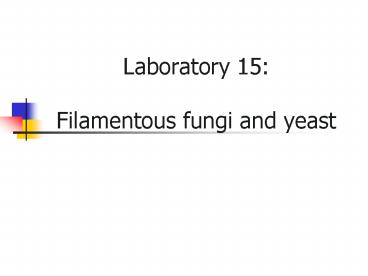Laboratory 15: Filamentous fungi and yeast - PowerPoint PPT Presentation
1 / 26
Title:
Laboratory 15: Filamentous fungi and yeast
Description:
Mostly terrestrial but some adapted to aquatic life. Aerobic or ... http://www.ttuhsc.edu/SOM/Microbiology/mainweb/aiaq/Pictures/Aspergillus niger. ... – PowerPoint PPT presentation
Number of Views:207
Avg rating:3.0/5.0
Title: Laboratory 15: Filamentous fungi and yeast
1
Laboratory 15 Filamentous fungi and yeast
2
Fungi
- 70 000 species described
- Macroscopic or microscopic
- Heterotrophic organism
- Unicellular or multicellular
- Mostly terrestrial but some adapted to aquatic
life - Aerobic or facultative anaerobe
- Prefer cool and damp niches
3
Eukaryote organisms
- Nuclei
- Membrane bound organelle
- Also differences in genetic material, replication
etc - No peptidoglycan
- Eukaryotehttp//www.windows.ucar.edu/earth/Life/im
ages/celltypes.gif
4
Dimorphism
- Fungus that can present 2 forms depending of
conditions - Yeast
- Filamentous fungi
- Could be opportunistic pathogens
http//gsbs.utmb.edu/microbook/images/fig75_3.JPG
5
Yeast
- Unicellular
- Non filamentous
- Spherical
- Membrane bound nucleus ? are eukaryote
- Facultative anaerobes
http//www.theartisan.net/yeast_cell_final_resampl
e.jpg
http//users.rcn.com/jkimball.ma.ultranet/BiologyP
ages/Y/Yeast.jpg
6
Filamentous fungi
- Multicellular organism
- Long branched filament called hyphae
- Hyphae aggregate to form a mass ? mycelium
- Aerobes
http//www.anselm.edu/homepage/jpitocch/genbios/31
-01-FungalMycelia-L.jpg
7
Sabouraud agar
- Selective media
- Contain sugars and peptone
- Low pH (5) which is inhibitory for most other
microorganisms - Invented by a French Doctor (Dr. Sabouraud)
specialist in scalp disease
http//www.bium.univ-paris5.fr/sfhd/img/gd/sabou.j
pg
8
Reproduction
- Sexual and asexual
- Asexual
- BuddingThe parent cell can divide into two equal
or unequal daughter cells - Spore prodution
- Sporangiospores
- Conidiospores
http//www.anselm.edu/homepage/jpitocch/genbios/31
-01-FungalMycelia-L.jpg
9
Reproduction
- Budding Yeast
http//www.mansfield.ohio-state.edu/sabedon/018ye
ast.gif
10
Reproduction
Conidiospores are not enclosed within a sac
Sporangiospores enclosed in a sac like head
called a sporangium
11
Mold growth
http//www.inspect-ny.com/sickhouse/1263s.jpg
http//ipm.ncsu.edu/current_ipm/colony.jpg
http//byebyemold.com/mold_images/images/penicilli
um/penicillium_c.jpg
http//www.mould.ph/images/curvul3.jpg
12
Aspergillus niger
http//res2.agr.ca/winnipeg/storage/images/lo-res/
mould/aspe06-l.jpg
http//www.ttuhsc.edu/SOM/Microbiology/mainweb/aia
q/Pictures/Aspergillus20niger.jpg
http//wellino.de/aspergillus/images/aspergillus-n
iger-5.jpg
13
Penicillium frequentans
http//www.anselm.edu/homepage/jpitocch/genbios/31
-14b-Penicillium.jpg
http//www.bioweb.uncc.edu/1110Lab/notes/notes1/la
bpics/Penicillium20notatum.JPG
14
Objective 1 Culturing yeast
A. Fermentation tubes Inoculate each yeast into a
glucose and a sucrose fermentation tube 2 tubes
per yeast, 8 total Incubate at 37oC
15
Objective 1A Culturing yeastNext lab (Wednesday)
16
Objective 1B Culturing yeast
- Streak yeast
- Divide 2 sabouraud plate in a half
- We have 4 different yeast
- Inoculate one per half (As you did for bacteria)
- Bakers yeast (1)
- Saccharomyces cerevisiae (2)
- Candida albicans (3)
- Rhodoturula rubra (4)
- Incubate at 37oC
17
Objective 1B. Culturing yeast(Next lab Wednesday)
- Put a drop of methylen blue on a slide and mix a
loopful of yeast. Put a coverslip on and observe
under the microscope - Draw your observations of your 4 yeast
18
Objective 2.A Culturing Molds
- Streak 3 filamentous fungi in Sabouraud.
- One mold per plate
- Do one straight line in the middle of the plate
- Aspergillus niger,
- Penicillium frequentans
- Rhizopus nigricans
- Next lab (Wednesday)
- Observe both bottom and top of the plate
19
Objective 2.B Environmental sample Molds
- Each team also does an environmental sample
(expose to the air). Incubate at 27oC. - Next lab (Wednesday)
- Observe both bottom and top of the plate
- Can you identify any of the contaminating molds
based on comparisons to the known molds?
20
Objective 3 Culturing 1 mold under slide culture
technique
- Pick up one mold to this part
- Some are very fragile and hyphae can break as
they are mounted onto a slide - To overcome this ? slide culture which is an in
situ culture of the fungi
21
Slide culture techniqueDay 1
- Using aseptic technique, place a block of agar on
a slide in a Petri dish - Inoculate the centers of the four sides of the
agar block with the study fungus - Cover the inoculated agar block with a steril
cover slip. - Using aseptic technique add 8 ml sterile water to
the bottom of the Petri dishes - Incubate at 25 C until sporulation occurs. Do
not invert the plate
22
Slide culture technique Next lab
- Carefully lift off the cover slip and lay aside
with the fungus growth upward - Lift the agar square from the slide and discard
- Place a drop of lactophenol cottom blue on the
slide and cover with a clean cover slip - With a clean slide place a drop of lactophenol
cottom blue near one end and cover with the
original cover slip. Make sure you can
distinguish between Sporangiospores and
Conidiospores.
23
Slide culture
http//www.botany.utoronto.ca/ResearchLabs/Malloch
Lab/Malloch/Moulds/Illustrations/Slide_culture.jpg
24
Slide culture
http//www.botany.utoronto.ca/ResearchLabs/Malloch
Lab/Malloch/Moulds/Illustrations/Slide_culture.jpg
25
Slide culture
http//www.botany.utoronto.ca/ResearchLabs/Malloch
Lab/Malloch/Moulds/Illustrations/Slide_culture.jpg
26
Synthesis
- Culture 4 yeast 2 Petri plates
- Culture 4 glucose fermentation tubes
- Culture 4 sucrose fermentation tubes
- Culture 4 molds
- Slide culture































